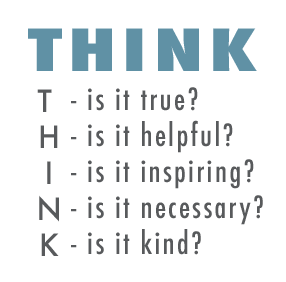Yehuda Berg who wrote the 72 Names of God, said, “Words are singularly the most powerful force available to humanity. We can choose to use this force constructively with words of encouragement, or destructively using words of despair. Words have energy and power with the ability to help, to heal, to hinder, to hurt, to harm, to humiliate and to humble.”
Recently we all been exposed to a lot of extremely negative rhetoric so when I came across an article by Eve Hogan entitled:
Tue, August 02 2016
Speak Your Heart, Not Your Mind
By: Eve HoganSince when did “saying what’s on your mind,” no matter what, become an admirable quality? While freedom of speech is a constitutional right, the ability to edit what you say, before you say it, is a personal responsibility. This is a relationship skill that will serve you whether you are talking to your parents, children, lover, boss, employees, clients, neighbors or the rest of the world.
We have a responsibility to realize the power of our words and be mindful of their trajectory. We have a responsibility to pay attention to how our words may land on the hearts of others. We have a responsibility to be aware of the potential consequences of our words and use them as wisely as possible.
Words can cast a spell on others. We can woo them, or we can harm them. We can call on others to make a difference or start a fight. We can soothe a soul or stab a heart with our words. In fact, wounds from sticks and stones will heal, but wounds from words fester, haunt, and can last long into the future.
“long after people forget your words they will remember how you made them feel. ”How someone receives our words, or translates them into a different meaning is not in our control. However, consciously aligning our words, thoughts, and actions with our values and our desired outcome is in our control. As Don Miguel Ruiz pointed out in The Four Agreements, “Be impeccable with your word,” is an essential skill for right livelihood and personal freedom.
When I was on a competition outrigger canoe team in my 20’s, the coach gave me some of the best advice for life I’ve ever gotten. He explained, “You want to move your body in the direction you want the canoe to go.” Simple as that sounds, he demonstrated how people tend to move their bodies side to side, which puts energy in an opposing direction and literally “rocks the boat.” Now I find myself using that as a metaphor for creating healthy relationships with others and with ourselves. We simply want to move in the direction we want our relationships to go, the direction we want our lives to go, aiming for the results we want.
I often hear couples say they want to create a healthier, more harmonious relationship, but say or think mean and judgmental things about their partners. This is an example of the action steps being out of alignment with the goal—rocking the boat, so to speak.
We have been raised with the suggestion that “honesty is the best policy,” but is it always? We all think a lot of things that probably should not even be thought, much less said. When we “speak our minds” and say whatever pops into our heads, it hasn’t gone through the “purpose and truth test.” While it may be honest to say what you think, your opinion is not the truth. Your opinion may not be purposeful to anyone else and it may be completely inaccurate. When you speak your mind without forethought, you back yourself into a corner that does not allow you the freedom to easily retract or change your mind. On second thought, you may wish you hadn’t uttered your first.
Before saying what you think is the truth, I invite you to question, “Do I know this thought is true?” and “Is there purpose to sharing this?” If you still want to share it, own it by saying, “My opinion is….” This gives you the freedom to change your mind if new evidence is revealed. It also gives others the freedom to have a different opinion.
Remember, too, that consciously or unconsciously we teach with our words. Our children are watching us. When we simply say what is on our minds without any editing for kindness, truth, compassion, purpose or clarity, we teach them that inflicting their words on others without forethought is acceptable behavior, too.
My opinion is that rather than unconsciously speaking our minds, we should reinforce responsible communication as an admirable quality and imperative relationship skill.
With all that in mind, I propose that before we speak, we all hit the pause button and THINK. How many of you are familiar with the acrostic THINK? In fact, how many of you are familiar with acrostics? An acrostic is a poem or word puzzle or other form where each letter of the word is assigned a word beginning with that letter that relates to the original word. Here is the THINK acrostic:

This acrostic is one of the most impactful frameworks for helping people change the way they interact with other people both one on one and in teams. Because we are hard wired as humans to be self centered especially when under stress, our communications often lack empathy and clarity. This acrostic serves as a behavioral script to help people press the “pause button” before speaking especially in high stakes situations. Once embedded as a habit its application can have a dramatic effect on both personal and business relationships.
Is It True?
Main Idea: Test the veracity of what you are about to communicate by factoring in your current emotional state and the quality/quantity of information at hand. If you are in a highly emotional state there is very good chance your objectivity has been reduced and or distorted. Remember that truth can be a matter of perspective and highly influenced by culture and protocol.
Is It Helpful?
Main Idea: As in the truth, our perception of what is helpful is also a matter of perspective. Generally, when under pressure our ability or willingness to put curiosity in front of judgement is compromised. We are hard wired to judge the threat or reward nature of everything we perceive minute by minute. In these moments we need to exercise a certain level of discipline in order to accurately determine whether what we are about to say will be helpful for the relationship versus what will be helpful for us.
Is It Inspiring?
Main Idea: I am reminded about an anonymous quote, “long after people forget your words they will remember how you made them feel.” Basically it means when you communicate or mobilize people to action, how you communicate your message will either inspire them to be committed and engaged, or discourage them to the level of compliance and helplessness. Before you speak, again hit the pause button to determine which you want, inspiration or discouragement. The bad news is that despite your best efforts to the contrary, your body language, tone and volume likely make the difference. The good news is all three of these elements can be easily changed.
Is It Necessary?
Quite often in intense but friendly debates with my wife, especially about politics, I have caught myself going farther and deeper on particular point than is really needed or required. You might have witnessed this same phenomenon in the work setting where people will be more concerned about being right than actually learning either new information or better information about the other person’s perspective. Testing for “is it necessary” is perhaps one of the best strategies for communicating effectively especially in executive presentations. This is particularly true when the audience believes your intent is to show off versus be clear. In my coaching practice I promote the B.L.U.F approach – bottom line up front.
Is It Kind?
For me, this is the most important element in this wonderful acrostic. Testing for kindness is very seldom done in either the personal or business realm. In fact in my experience, kindness is sometimes considered a sign of weakness. The challenge for this one is that we deceive ourselves into believing that kindness takes time, a lot of energy and because we are busy and overwhelmed ourselves, we have an implicit licence to simply express ourselves. This is especially true when we are in a state of overwhelm because our company has launched more airplanes (aka projects and initiatives) than it can safely land. The fact is that we are social animals and how we connect with others makes the difference in how well we are able to cope with the pressures of today’s fast paced, multicultural business environment. Kindness matters as does this whole THINK acrostic.
Please feel free to download a wallet-sized copy of the THINK acrostic and I hope that for every interaction, you will pause and just THINK.
I’m going to finish with another quote that I really liked:
“Kind words are a creative force, a power that concurs in the building up of all that is good, and energy that showers blessings upon the world.” -Lawrence G. Lovasik

